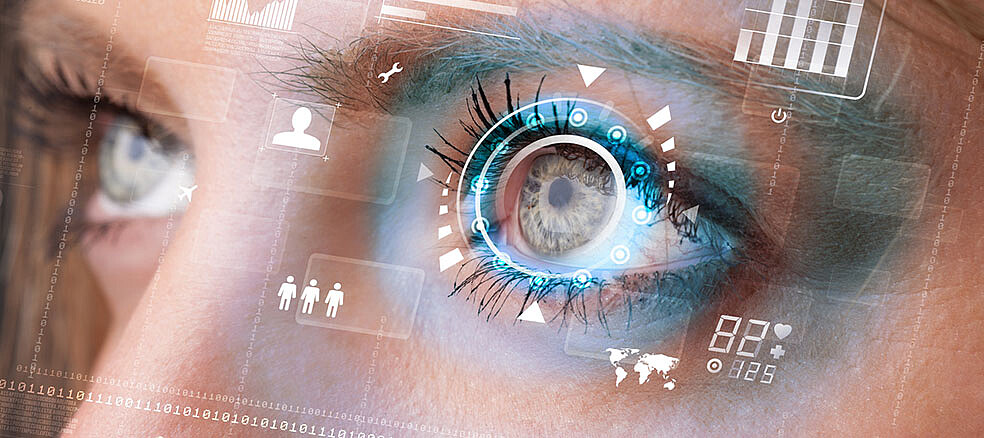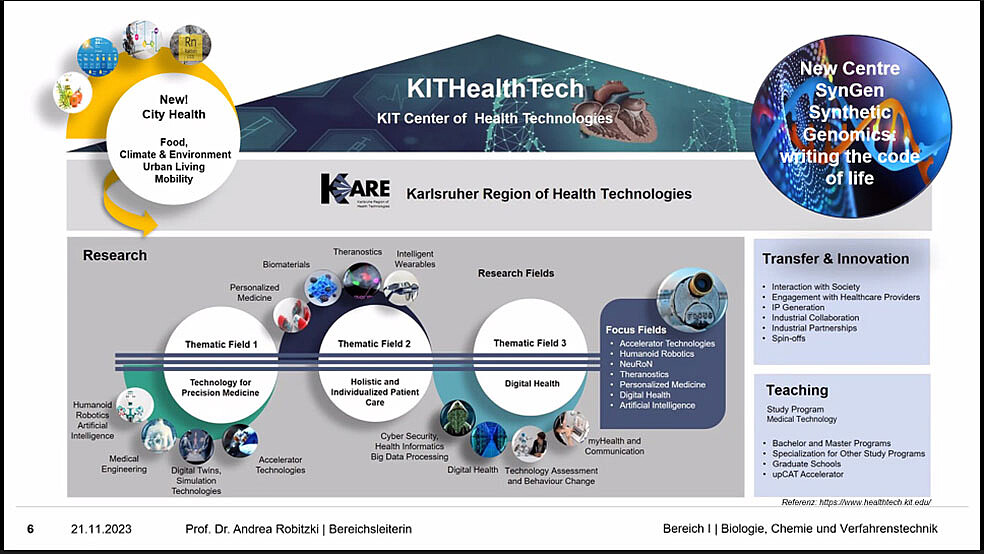Published on December 08, 2023
Healthy into the future – medical technology made by KIT

„There are a thousand diseases, but only one health.“
Ludwig Börne
Even 200 years after Börne's recognition, this statement is still valid.The enormous increase in knowledge and progress in healthcare is offset by the fact that disease patterns and treatment options are also becoming increasingly complex. The question therefore arises again and again as to how progress in medical technology can be achieved in order to successfully restore, maintain and protect the health of each individual.
The new KIT Center for Health Technologies (KITHealthTech) will provide answers to this in the future, emphasized Prof. Andrea Robitzki, Head of Division 1 – Biology, Chemistry and Process Engineering at KIT. She is one of the initiators of the newly created center and welcomed the participants to the "Healthcare in Transition" theme day on 21 November 2023. At KITHealthTech, research is an ongoing strategic process to help shape the future of health technologies, particularly in the fields of precision medicine, personalized medicine and digital health solutions. Using several examples, the center's scientific guests provided an insight into the key aspects of their research.
Personalized medicine with the help of printed organs
This is the vision of Prof. Ute Schepers from the Institute for Functional Interfaces (IFG). Her Chemical Biology working group, together with a number of other research groups at KIT, is working on new production methods for biological materials and their use. The researchers are developing bioinks, working successfully on 2D and 3D printing of biological tissues for "organs-on-chips" and creating miniaturized test systems for laboratories. The aim is to facilitate and even accelerate the (personalized) design and testing of medical agents. With artificial organs and cell systems, animal testing should be reduced to a minimum in the future. The focus is on further developing these skills together with industry.
Experimental room for radiation research
Fundamentally new technological approaches are needed in radiation research and imaging in order to make radiation medicine systems more precise, energy-saving, cheaper, more compact and therefore easier to handle. The KIT's Accelerator Technology Platform (ATP) offers optimal conditions for this, emphasizes Prof. Anke-Susanne Müller from the Institute for Beam Physics and Technology (IBPT). Thanks to the wide-ranging and interdisciplinary expertise available at the ATP and the ideal infrastructure, KIT offers the best conditions for joint innovation projects between industry and science in radiation medicine. Current projects deal, for example, with the control of radiation, data analytics and visualization through to the energy efficiency of such systems, e.g. through the use of new superconductor methods, or flash irradiation as a new, gentle irradiation technique.
Digitization as a matter of the heart
What sounds like a dream of the future is already a reality for PD Axel Loewe from the Institute for Biomedical Engineering (IBT): patient-specific digital twins of biological systems, such as the heart, allow data-supported simulation of organs and therefore more individualized and precise medical treatments. Mr Loewe demonstrates this using modelled and functionalized twins of the human heart, which he creates with the help of new imaging techniques and sensor data. By simulating possible surgical interventions on the digital twin, real interventions can be planned more precisely and limited in scope. The effectiveness of various treatment methods or medications can also be predicted, optimized and their use made more precise.
An ear for biosensors
Did you know that the muscles around the ear can reveal a great deal about the body's biological functions? Prof. Michael Beigl from TECO at the Institute of Telematics (TM), whose focus includes wearables for continuous health monitoring, demonstrated this. With the so-called "OpenEarable", TECO has developed a "hands-free interface" that provides access to a range of activity and body parameters. The system is worn on the ear and offers a range of sensors and data analytics options. The "ear tracker" is not only being continuously improved and expanded at TECO, but is also available to external partners for open source use and co-innovation.
Other exciting topics from health research at KIT were highlighted in a variety of technology snapshots. Exciting research projects relating to low-cost approaches for medical analytics, personalized biosensors and data-based optimization for emergency logistics were discussed. The spin-off Validaitor provided a glimpse into the regulatory future: from 2025, there is to be an EU-wide regulation on the use of AI applications to ensure safety and trustworthiness. Validaitor supports companies in developing legally compliant AI solutions for the medical sector.
The theme day had a lot to offer the guests and made it clear that KIT has a diverse and interdisciplinary research landscape in the field of health, which can achieve important progress and innovative solutions, especially in cooperation. The new degree courses at KIT – Medical Technology (Bachelor) and Biomedical Engineering (Master) – which were presented by course coordinator Prof. Werner Nahm from the Institute for Biomedical Engineering (IBT), are an expression of this fact. He emphasized the importance of industry as a driving force and player in incorporating the current and emerging needs of medical technology companies into the training of future specialists. What applies to teaching is just as important for research, development and innovation. The KIT Business Club is therefore delighted with the response to the theme day and will continue to work with interested parties to deepen the exchange in this field.


comments about this article
No Comments